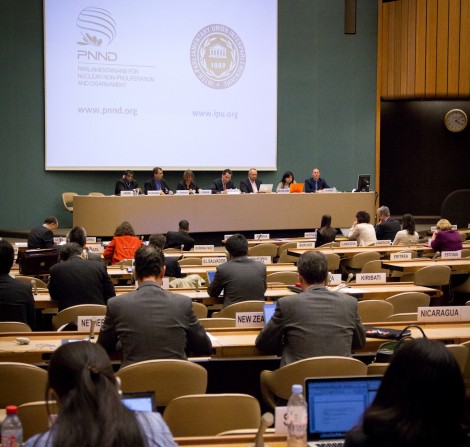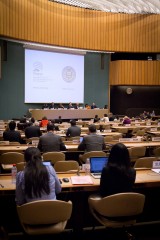A new and exciting United Nations nuclear disarmament process got off to a very positive start with its first two weeks of deliberations in Geneva on May 14-24, 2013.
The Open Ended Working Group on Taking Forward Multilateral Nuclear Disarmament Negotiations, established by the United Nations General Assembly, injected a breath of fresh air into the political environment that has for the past 17 years prevented any substantive work being undertaken by the Conference on Disarmament (CD) – the world’s primary multilateral disarmament negotiating body.
Under the superb chairmanship of Ambassador Manuel Dengo of Costa Rica (a country that abolished its army in 1949 and is a strong supporter of cooperative security and nuclear abolition), delegates from countries threw away the usual self-congratulatory statements and dogmatic positions that dominate the other main multilateral forums (CD, United Nations General Assembly and the Non-Proliferation Treaty Review Conferences), and instead engaged in interactive dialogue on key issues for establishing the framework and undertaking negotiations for a nuclear-weapons-free world.
As a result, delegates began to break out from the usual divisions over a disarmament focus versus a non-proliferation focus and various competing approaches to disarmament, such as step-by-step v comprehensive, and instead searched more constructively for compromise and common ground. This included ideas like building blocks (on work which could be undertaken simultaneously) and a roadmap or framework for a nuclear-weapons-free world.
Ambassador Dengo was able to achieve this by organising these first two weeks of the OEWG as primarily informal sessions focusing on specific issues with introductions by experts – rather than as formal sessions seeking government positions. Delegations were thus freed from the usual requirement to check any intervention/statement with their capitals, and could open up to asking questions, putting forward undeveloped ideas, and discussing these without feeling bound by any comments made.
Another refreshing aspect of the OEWG was the openness to Civil Society Organisations to participate in the same way as the government delegates. CSOs were not confined to the usual practice in other multilateral disarmament bodies of only being able to make comments/interventions in a special session dedicated to CSO views. Rather, we could intervene with questions, reflections and proposals at any time just like any government.
In addition, there was a special session on the role of parliaments and parliamentarians in promoting and supporting multilateral preparatory work and negotiations for a nuclear weapons free world. It was organised by the Inter Parliamentary Union (which includes over 160 parliaments including most of those of the nuclear-weapon States and their allies) and Parliamentarians for Nuclear Nonproliferation and Disarmament (PNND).

OEWG session on the role of parliaments and parliamentarians, 23 May 2013
PNND Co-Presidents Sue Miller (UK, House of Lords) and Saber Chowdhury MP (Bangladesh, President of the IPU Standing Commission on International Peace and Security) spoke of the roles that parliamentarians play in representing civil society to government, and in reaching across national boundaries to build international parliamentary support. This is reflected in the IPU 2009 resolution on nuclear disarmament, the PNND/IPU Handbook that has gone to every parliament and the recent to focus on the achievement of a nuclear weapons free world and the contribution parliaments can make.
In April 2013, Abolition 2000 established a Task Force on the OEWG with membership open to anyone interested in supporting multilateral nuclear disarmament negotiations to achieve a nuclear weapons convention or package of agreements to prohibit and eliminate nuclear weapons globally.
For more information see:
- Latin America: A Pope and a Nuclear Disarmament Chair
- Are you open to a nuclear-weapons-free world? Join the Abolition 2000 Task Force on the UN Opened Ended Working Group!
- Reflections on the May sessions of the OEWG and visions for successful outcome
